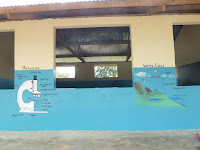Introducing Moses
We’d like to introduce Moses, our Masai (or ‘Maasai’) night guard (‘askari’). The VSO
office in Dar es Salaam suggested we should have an ‘askari’, and our
housemate, Niki (who is back in Alberta now) learned from a Ministry of Education
school inspector, Ramla, that Moses was available. Ramla, along with a young
Masai friend of Moses, called Losaro, who speaks English, acted as interpreters.
Moses is on the job
from 6:00 pm to 6:00 am, with a day off each week. Of course, these times are based on ‘African
Time’: it might be better to say sundown to sunrise. He has never missed a day,
and takes his job very seriously. He sits in a chair in the shadows, with a
small pile of rocks and his
‘eremet’ – a spear/walking stick that every
warrior is given at a young age---on the ground beside him. He is
up at the door in the wall to check every sound. VSO is paying his salary of
Tsh 80,000 (Tanzanian shillings, about $50.00 a month, which is the average monthly
salary in Zanzibar), but we have padded it.
Masai villages are all on the mainland, in northern Tanzania
and Kenya. Our landlord spoke to him and learned that he has no place to live
or sleep. With the landlord’s help, we
bought him a bed and mattress. He now sleeps on our covered porch during the
day. He has Masai friends in similar situations he meets with during the day
for tea and talk. We provide water by filling large plastic containers for
drinking and washing, and a bucket for washing his two clothing items and a
blanket.
The Masai culture makes fascinating reading: http://en.wikipedia.org/wiki/Maasai_people
When we go to Sri Lanka for two weeks over Christmas, Losaro
will be our daytime askari. He has made it clear that he feels strongly that Moses
and he should not and will not take days off while we are away. It turns out
that he was right.
Added the following morning:
We came back from Stone Town about 9:00 pm, to a very
agitated and excited Moses. From what we could surmise from the few words we could
pick out from his long explanation, and his gestures, two boys or young men on
bicycles had climbed over our wall and were very surprised to see Moses approaching
them, swinging his stick and beating it on the ground. They scrambled back over
the wall and rode away quickly. He ended his story with a laugh, so we think
he was amused that they took him seriously. We have no concerns about our personal safety.























